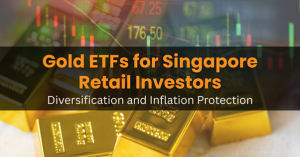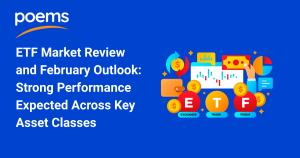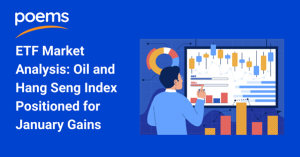ETF Investing for Mid-Career (30-50 Years Old) August 27, 2024

As you progress through your career from 20 to between the ages of 30 and 50, your financial goals tend to change. Whether you’re focused on growing your wealth, managing risk, or ensuring financial stability as you approach major life milestones such as buying a home, starting a family, or investing in property like an HDB flat, ETF investing offers a versatile approach to achieve these objectives. This article discusses the strategies for optimising your ETF portfolio by including a balanced mix of investments across Singapore, regional, and global/US market exposure.
1. Diversify Across Markets
Singapore Market:
- Straits Times Index (STI) ETFs: For core Singapore exposure, consider choosing ETFs tracking the STI, such as the SPDR Straits Times Index ETF (ES3) or the Nikko AM Singapore STI ETF (G3B). These can serve as a stable foundation as you plan for significant milestones like purchasing a BTO flat or investing in real estate.
- Singapore REITs: To tap into Singapore’s robust real estate market, invest in the Lion-Phillip S-REIT ETF This option could complement your goals of building a property portfolio or securing income through real estate investments.
Regional Markets:
- ASEAN ExposureBroaden your regional exposure with ETFs like the Lion-OCBC Securities Hang Seng TECH ETF which focuses on Asian tech giants or the NikkoAM-StraitsTrading Asia ex Japan REIT ETF or regional real estate. These ETFs can support your long-term financial goals as you consider expanding your family or upgrading your home.
- China and India: Diversify into major Asian economies with ETFs like the ICBC CSOP FTSE Chinese Government Bond Index ETF for China or ETFs tracking Indian indices, which could serve as growth drivers in your portfolio as you work towards your financial goals.
Global/US Markets:
- S&P 500 ETFs: For broad exposure to the US market, consider investing in the SPDR S&P 500 ETF (SPY) or the Vanguard S&P 500 ETF (VOO).These ETFs give you access to leading global companies that can support your long-term wealth-building strategy.
- Global Diversification: To achieve comprehensive global market coverage, the Vanguard Total World Stock ETF (VT) is a strong choice. This ETF ensures that your portfolio remains well-rounded and resilient against market fluctuations.
2. Balance Growth and Stability Across Regions
Focus on Growth:
- To capitalise on diverse growth opportunities, allocate a significant portion of your portfolio to equity ETFs across different markets. A balanced approach might involve dedicating 40% to Singapore, 30% to regional, and 30% to global/US equity ETFs. Adjust these percentages based on your risk tolerance and market outlook, particularly if you’re planning for significant financial commitments.
Enhance Stability:
- For stability, incorporate a diversified mix of assets, including bond ETFs and income-generating investments. A potential portfolio composition could be 60% to equities, 20% to bonds, and 20% to income-focused ETFs. The ABF Singapore Bond Index Fund offers local bond exposure, while global bond ETFs like the Vanguard Total International Bond ETF (BNDX) provides international diversification. This approach can help cushion against volatility as you prepare for long-term commitments.
3. Tailor Sector-Specific Strategies
Technology Sector:
- Regional:Consider investing in the Lion-OCBC Securities Hang Seng TECH ETF to gain exposure to leading Asian tech companies.
- Global The Invesco QQQ Trust (QQQ) offers exposure to US tech leaders, a sector that continues to be a key driver of global innovation and growth.
Healthcare Sector:
- Regional: Explore ETFs tracking Asian healthcare indices like the CSOP China Healthcare Disruption ETF This growing sector benefits from the increasing demand for healthcare because of the ageing population.
- Global
For broader exposure, consider the Vanguard Health Care ETF (VHT) which includes top global healthcare companies, ensuring your portfolio taps into long-term growth sectors.
Financial Sector:
- Regional: Consider the Lion-OCBC APAC Financials ETF as a stable long-term option to gain exposure to the robust financial sector in Singapore and the broader region.
- Global: The Financial Select Sector SPDR Fund (XLF) provides a broader reach into global financial institutions and is ideal for balancing your portfolio with defensive and growth-oriented assets.
4. Implement Income Generation Strategies
Focus on Dividend ETFs:
- Singapore: For steady income, ETFs with a focus on high-dividend stocks are worth exploring. In Singapore, the Phillip Sing Income ETF is one potential option.
- Global: To gain global dividend exposure, consider the Vanguard International High Dividend Yield ETF (VYMI).This ETF offers a diversified income stream from international markets.
Invest in REIT ETFs:
- Singapore: The Lion-Phillip S-REIT ETF offers direct exposure to Singapore’s real estate market and provides stable income stream with the potential for capital appreciation. This aligns well with property investment goals.
- Regional:Broaden your portfolio with the NikkoAM-StraitsTrading Asia ex Japan REIT ETF which offers a comprehensive view of Asia’s real estate sector.
- Global:For diversified real estate investment across developed markets, global REIT ETFs are a smart choice, to obtain access to income-generating properties worldwide.
5. Practical Tips for Global Investing
Manage Currency Risk:
- When investing in international ETFs, be mindful of currency fluctuations. Some ETFs offer currency-hedged versions, which can help mitigate this risk. Currency-hedged ETFs include special contracts that help protect against changes in the value of foreign currencies. If the currency strengthens, these contracts help to balance out any potential losses and ensure your investments remain stable despite currency fluctuations.
Regularly Rebalance Your Portfolio:
- Regular rebalancing is vital to maintain your desired asset allocation. Aim to review and adjust your portfolio every 6 to12 months or whenever your portfolio’s allocation significantly deviates from your target. This practice helps to keep your investments on track with your financial goals.
Stay Informed and Updated:
- Staying informed about global market trends is key to making sound investment decisions. Tap into resources such as the SGX Academy Morningstar, and international financial news outlets to stay updated on market developments. This knowledge will help ensure your portfolio remains resilient and aligned with your financial aspirations.
Conclusion:
The mid-career stage is pivotal for refining your investment strategy, especially as you approach significant life milestones. Diversifying your ETF portfolio across Singapore, regional, and global/US markets, can help you build a strong financial foundation. With this approach, you can confidently pursue your career and personal aspirations, knowing that your investments are well-positioned to support your long-term goals.
Your next step: save these useful resources under your investment arsenal.
Disclaimer
These commentaries are intended for general circulation. It does not have regard to the specific investment objectives, financial situation and particular needs of any person who may receive this document. Accordingly, no warranty whatsoever is given and no liability whatsoever is accepted for any loss arising whether directly or indirectly as a result of any person acting based on this information. Opinions expressed in these commentaries are subject to change without notice. Investments are subject to investment risks including the possible loss of the principal amount invested. The value of the units and the income from them may fall as well as rise. Past performance figures as well as any projection or forecast used in these commentaries are not necessarily indicative of future or likely performance. Phillip Securities Pte Ltd (PSPL), its directors, connected persons or employees may from time to time have an interest in the financial instruments mentioned in these commentaries. Investors may wish to seek advice from a financial adviser before investing. In the event that investors choose not to seek advice from a financial adviser, they should consider whether the investment is suitable for them.
The information contained in these commentaries has been obtained from public sources which PSPL has no reason to believe are unreliable and any analysis, forecasts, projections, expectations and opinions (collectively the “Research”) contained in these commentaries are based on such information and are expressions of belief only. PSPL has not verified this information and no representation or warranty, express or implied, is made that such information or Research is accurate, complete or verified or should be relied upon as such. Any such information or Research contained in these commentaries are subject to change, and PSPL shall not have any responsibility to maintain the information or Research made available or to supply any corrections, updates or releases in connection therewith. In no event will PSPL be liable for any special, indirect, incidental or consequential damages which may be incurred from the use of the information or Research made available, even if it has been advised of the possibility of such damages. The companies and their employees mentioned in these commentaries cannot be held liable for any errors, inaccuracies and/or omissions howsoever caused. Any opinion or advice herein is made on a general basis and is subject to change without notice. The information provided in these commentaries may contain optimistic statements regarding future events or future financial performance of countries, markets or companies. You must make your own financial assessment of the relevance, accuracy and adequacy of the information provided in these commentaries.
Views and any strategies described in these commentaries may not be suitable for all investors. Opinions expressed herein may differ from the opinions expressed by other units of PSPL or its connected persons and associates. Any reference to or discussion of investment products or commodities in these commentaries is purely for illustrative purposes only and must not be construed as a recommendation, an offer or solicitation for the subscription, purchase or sale of the investment products or commodities mentioned.
About the author
MuMing Yong
ETF Specialist
Phillip Securities Pte Ltd
Mu Ming traded and invested for more than 8 years in various instruments including ETFs, Equities, Unit Trusts, Options, DLC, CFD, and ILP from the US, SG and HK market. He's a believer of personal finance, macroeconomics, and, technical analysis - so much so that he found himself analysing his social media engagement using trend lines and patterns.

 Gold ETFs for Singapore Retail Investors: Diversification and Inflation Protection
Gold ETFs for Singapore Retail Investors: Diversification and Inflation Protection  ETF Market Review: February Outlook Signals Strong Performance
ETF Market Review: February Outlook Signals Strong Performance  ETF Market Analysis: Oil & Hang Seng Set for January Gains
ETF Market Analysis: Oil & Hang Seng Set for January Gains  Buffer ETFs — What Are They and How Do They Work?
Buffer ETFs — What Are They and How Do They Work? 





